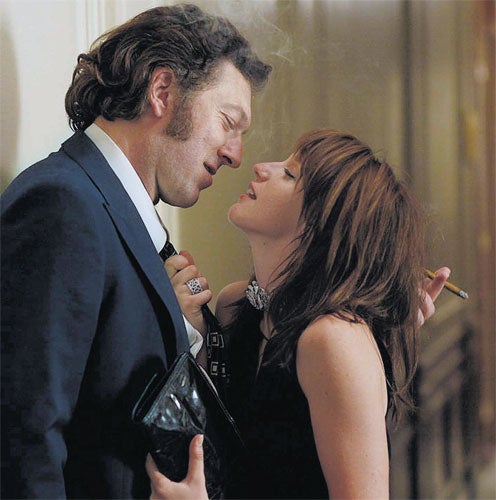Mesrine: Killer Instinct (15), Jean-François Richet, (113 mins)<br/>Home (15), Ursula Meier (98 mins)
<p class="tagline">Mesrine: Killer Instinct: <img src="http://www.independent.co.uk/multimedia/archive/00231/4-STARS_231323a.gif"></img> Home: <img src="http://www.independent.co.uk/multimedia/archive/00231/3-STARS_231324a.gif"></img></p>

Your support helps us to tell the story
From reproductive rights to climate change to Big Tech, The Independent is on the ground when the story is developing. Whether it's investigating the financials of Elon Musk's pro-Trump PAC or producing our latest documentary, 'The A Word', which shines a light on the American women fighting for reproductive rights, we know how important it is to parse out the facts from the messaging.
At such a critical moment in US history, we need reporters on the ground. Your donation allows us to keep sending journalists to speak to both sides of the story.
The Independent is trusted by Americans across the entire political spectrum. And unlike many other quality news outlets, we choose not to lock Americans out of our reporting and analysis with paywalls. We believe quality journalism should be available to everyone, paid for by those who can afford it.
Your support makes all the difference."Public Enemy Number 1" was once a term of fear and loathing. Now it has become a title of respect, a sort of accolade. After all, it takes something to be number 1, even if it's earned through robbery, murder and mayhem. Jacques Mesrine may never be as famous as a Capone or a Dillinger, but in France during the 1960s and 1970s he was the celebrity outlaw, a walking, talking "Wanted" poster whose criminal outrages kept him firmly in the public eye. The writer-director Jean-François Richet, saluting his legend, has awarded Mesrine a biopic in two parts, the second of which is out later this month. Considering the last subject of a cinematic two-parter was Che Guevara, that's some tribute.
Like Che, Richet's film is structured chronologically, though it's nothing like as plodding as Soderbergh's hagiography. Following war service in Algeria, Mesrine (Vincent Cassel) lives with his parents, but finds the lure of the hoodlum's life irresistible. He becomes the trusted lieutenant of burly mobster Guido (Gérard Depardieu), despite having a wife (Elena Anaya) and family to support. Having escaped a murder attempt, he flees with his partner in crime Jeanne (Cécile de France) to Montreal, where he bungles a kidnapping and lands up in a brutal Canadian prison.
Was he a natural-born criminal, or did circumstances force him into the underworld? The film's not telling, preferring to pile up violent episodes in Mesrine's colourful career. Psychologically, it feels thin – one moment he has a job, the next he's robbing banks – but dramatically, there's always something going on. The prison years, for instance, might have made a movie in themselves.
While the epic length and Sixties setting suggest a French GoodFellas, this is a one-man show, not an ensemble piece. Cassel is on screen nearly the whole time, exuding through his feral eyes and lazy swagger the authentic tang of criminality. However Mesrine was in real life, it feels plausible: he's coiled and touchy, but he's also good at biding his time. There's an inevitable air of unfinished business hanging over this first instalment, though it moves at a tidy lick and conjures an atmosphere rank with Gauloises and greed.
Home is also French, but different in mood and pace, offering an uncertain vision of togetherness after the rapacious individualism of Mesrine. A family, headed by parents Marthe (Isabelle Huppert) and Michel (Olivier Gourmet), live in a house that sits on the edge of an abandoned motorway. They're an odd yet strangely innocent lot, thinking nothing of their nakedness at bathtime and horsing around. When they're seen squeezed up on the sofa watching telly, they could be a live-action version of the Simpsons. But rural idyll comes face to face with urban progress when the authorities decide to open the motorway after 10 years of neglect.
Ursula Meier's film, styled "a road movie in reverse", sets its static characters against a backdrop of frenetic motion and waits to see how they cope. The sulky older daughter continues as though nothing has happened, stretched on a sun-lounger. The precocious tween daughter (a Lisa Simpson in the making) monitors the levels of pollution while the young son watches warily as his parents begin to fight. Marthe, girlish and brittle, is determined not to leave; Michel, driven mad by the racket, wants to move them out.
The mood leaks from elegy into black farce as the family's space becomes ever less tenable. Meier has a good eye for incongruities – sunbathing at the edge of a motorway, or the whole family lugging a freezer across it – and notices odd habits, such as the way both father and daughter open cartons of cigarettes by bashing them against a solid object. But the absurdity has darkened by the time she makes reference to Godard's Weekend in a scene where the holiday traffic comes to a standstill and the family weave between the vehicles, like nomads amid a two-lane car park.
Home is actually less a road movie than the domestic-invasion movie taken to its sick conclusion. It asks the question: how long can one call a place home when the things that made it so – comfort, privacy, health, sanity – are all being taken away?
Join our commenting forum
Join thought-provoking conversations, follow other Independent readers and see their replies
Comments